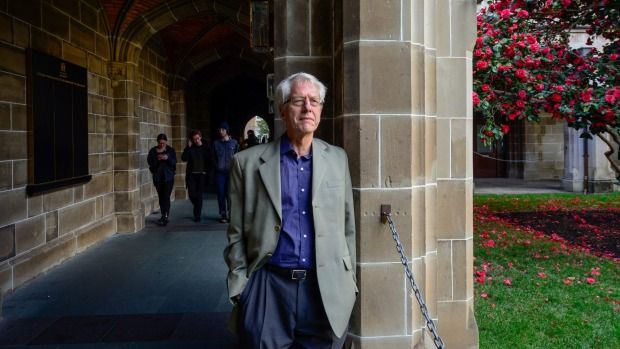In 1993, as a freshly minted Harvard graduate and thrilled by my appointment to teach constitutional and administrative law at Melbourne University, I had an idea of academia as seen through a student’s eyes. But it was on being introduced to Professor Stuart Macintyre from the school of history that I got to see the ideal of what it really meant to be an academic in action. He had earlier taught me in a large lecture theatre when I was an undergraduate arts/law student, but I only met him when I started writing about Australian citizenship as a legal scholar. Stuart’s work on civics and citizenship made him an obvious mentor but he was more than that, he was an exemplar citizen, to use Professor Frank Bongiorno’s recent dub and an inspiring historian and teacher.
In 1994 Stuart led an inquiry into reviving civics and citizenship education. It found little understanding and awareness of the Australian system of government — our federal structure and of the Commonwealth constitution. But there was a spark of hope with the Inquiry’s finding of a higher level of interest in civic issues and an appreciation of the value of citizenship.
Stuart wrote about this in a 1997 Parliamentary paper asking: “How is that aspiration [the higher level of interest] to be connected to knowledge and understanding? How might we promote the civic capacity?” In other words, how do we ensure that all Australians have the knowledge and wherewithal to be truly active citizens?
The inquiry’s recommendations dealt mostly with school education and were accepted in 1995 by the Keating government and later implemented by the Coalition ministry.
In 1997 Stuart felt that had he a chance to rewrite the report he would have done so even more convinced that an understanding of the history of citizenship holds the key to a higher interest in and appreciation of civic issues. In that same year, I published one of my early articles on the history of citizenship in Australia, around which we had great conversations. Those chats were but one example of Stuart as a model of academic collegiality (as many have written ) and it is hard to estimate how many references he wrote for me for various fellowships and awards which, thanks in no small part to him, I am proud to have held.
In mourning his death last November, I began revisiting his penultimate book, Australia’s Boldest Experiment: War and reconstruction in the 1940s. While some attention has been given to the book about its guide to a post COVID reconstruction of Australia, it is the sections of Stuart’s book about women and their role in the reconstruction that stand out for me. They illustrate how some things have changed since those days but powerfully, also, how many things remain shockingly the same.
Flora Eldershaw, a Sydney history graduate, schoolteacher, distinguished novelist and the first woman president of the Fellowship of Australian writers, was recruited by the government in the early 1940s to the small reconstruction division within Harold Holt’s department Scientific and Industrial Research to advise on the role of women. She had three strikes against her — the only woman in the division, the only one without an economics degree and also the oldest of the group. But she rose above the prejudices of her time, and subsequently, to do what most advising government should do – she consulted with a diverse group of women. She met with the Housewives Association, the National Council of Women, the Country Women’s Association, and the Federation of University Women, all of them keen to be involved. She reported their key concerns — ‘employment, living conditions, education, child welfare, health, legal rights and the circumstances of Aboriginal women’. But, as Stuart explains, the then head of the division poured cold water on her proposal warning ‘it was desirable to avoid giving official recognition to conferences of rather miscellaneous organisations.’ Those advocating on gender policy today, consulted for their views, would feel a sense of Déjà vu. Yes, the experience of spending time and energy responding to calls from government to contribute to policy development, consulting widely, and then having their ideas ignored.
Another part of Stuart’s book highlighting women’s involvement in the post war reconstruction project is the section on housing. Government publicity around this was aimed at “Mrs Australia” and with the promise that she would be able to build her dream house. This led to the South Australian secretary of the Housewives Association complaining her organisation was inundated with bulletins ‘on such inane matters as the height of wash troughs’.
In May of 1942, an Opposition member asked the Prime Minister how many boards, trusts, commissions and other special agencies had been set up as part of the reconstruction. He wished to highlight the proliferation of such bodies and asked a supplementary question about the number of women involved as members. The answer was 67 organisations, with 387 members, but just one woman and with an ironic name — Ellen Couchman. She had served on the Women’s employment board and was there to represent all Australian women! As Stuart reports, women’s organisations were less than impressed.

Flora Eldershaw. Unknown author, Public domain, via Wikimedia Commons
Ever since Flora Eldershaw had approached them back in 1941 they had been advocating for their involvement in the post-war reconstruction. Having been earlier rebuffed, they were ‘particularly exasperated’ by the omission of any reference to women in the Constitution Alteration (War Aims and Reconstruction) Bill the government introduced to the Parliament. The United Associations of Women wrote to the PM asking him ‘to introduce an amendment which would free women once and for all from the multifarious discriminations and limitations imposed on the by-laws and regulations.’ The Federation of Women Voters urged that the Bill should include ‘equal economic, political and social rights’. As President of the Council for Women in War Work, the historian Kathleen Fitzpatrick proposed the elimination of all forms of sexual discrimination. She argued — ‘this country cannot be considered a democracy while women remain, despite legal equality, in effect a subject race.’ These appeals had no effect and the only women present at the Constitutional Convention in November were 12 members of the Women’s Royal Australian Navy Service who acted as orderlies.
Eighty years later, those appeals are familiar to women working for equality in Australia. On Sunday 27thFebruary 2022 the Women’s March for Justice will be holding its anniversary event of the 15th March 2021 that drew over 110,000 women and their allies in more than 200 cities and towns around Australia, to draw the government’s attention to the ongoing unaddressed demand for equality and justice for women in Australian society.
This inequality underpins women’s safety inside the very house of Parliament, and led to the Independent Review into Commonwealth Parliamentary Workplaces report.
The report highlights the desperate need to ensure women are safe in every dwelling in Australia, let alone live in an equal and just society. Women’s safety is directly related to gender equality; without one we cannot have the other. The report is clear that in workplaces where women are equally present as leaders, a more equal work place leads to a safer workplace and a safer society.
Stuart Macintyre emphasised in writing of the reconstruction project, that once it became official policy, there were determined efforts to stimulate popular participation. In this part, the most ambitious was the desire to ‘enlarge citizenship and establish a new relationship between government and the people.’ In the remaining months before the Federal election, we should all be energised by the moment we are in, seeking to work towards a post-pandemic normal, to be demanding the same of those elected, and using our citizenship – our vote – to have a government that better reflects the needs of Australian women and men, working towards a society that is safe for all. And Stuart Macintyre’s collegiality should be an inspiration to active citizenship beyond the vote – looking out for our fellow members as we move forward as an inclusive nation.
- Feature image: Professor Stuart Macintyre AO, 1947 – 2021. Picture: University of Melbourne
This article was originally published in The Canberra Times.
Kim Rubenstein is a Professor in the Faculty of Business Government and Law at the University of Canberra, which has supported the production of the new podcast series It’s not just the vibe, It’s the Constitution. She is a Fellow of the Australian Academy of Law and the Academy of Social Sciences in Australia.





